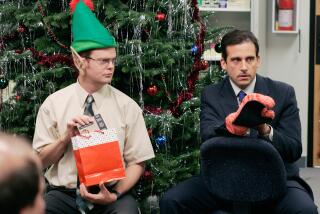Playing to Win
SAN FRANCISCO — The pudgy computer engineer takes a long pull on his Budweiser before buckling himself into the bright blue plastic harness. A bell sounds, and for the next 30 seconds, he strains as he tries to run as far as he can on an inflatable mattress while a taut bungee cord threatens to snap his body back against a padded backboard.
In another corner, a group of people strap big stuffed arrows around their waists and hurl themselves at an oversize dartboard. A few yards away, engineers take turns zipping themselves into a Velcro-studded jumpsuit before stumbling through a giant inflatable obstacle course.
For the Altera Corp. employees, this organized play was part of a work-related corporate training conference. The San Jose chip maker is one of dozens of high-tech companies using these sessions as a way of building teamwork and breaking down communication barriers. The creative play session, held recently at San Francisco’s Masonic Auditorium, capped off several days of intense training sessions for members of the company’s worldwide staff of field engineers and top sales consultants.
“We look each year for creative ways to have fun while they’re working,” says Robert Blake, who supervises Altera’s field application engineers. Team-building competitions are a growing part of the special events put on by Total Rebound, a Benicia, Calif.-based company that has been putting on such events for seven years. Among its high-tech clients are Borland International Inc., Cisco Systems, Intel Corp., Microsoft Corp. and Oracle Corp.
Spurred by the fierce competition for employees, technology companies are looking for different ways to attract and keep the best people, including holding unusual parties and team training exercises.
“You retain your employees by being different from your competition,” says Kathy Wheeler, corporate events planner for Cadence Design Systems Inc. “It’s not just a paycheck.”
*
In addition to renting Total Rebound games, the chip-design software company hired Mountain View, Calif.-based Amazing Events for an exercise in which employees built mini-hot-air balloons.
“They are having fun and don’t realize what they are doing until afterward,” Wheeler says.
While big corporations such as Clorox Co., Walt Disney Co., Bank of America and Motorola Inc. also use Total Rebound, high-tech companies have been particularly active in organizing hands-on events as part of an overall employee productivity strategy, says Total Rebound President John Wilkinson.
PeopleSoft Inc., a fast-growing client services software maker in Pleasanton, Calif., rounded up 200 employees last month for a games competition in a local hotel ballroom. Putting the same people in a room for a lecture about teamwork would have surely been a disaster, says Barry Wright, vice president of PeopleSoft’s U.S. operations.
“The software people we have who are young, aggressive and dynamic would fall asleep or they would throw things at us,” Wright says, only half-jokingly. “They like to participate in a decision and the culture of the company is one of empowerment.”
Getting employees to think differently, work together and be flexible is an essential part of doing business in the ‘90s.
“Our industry is very fast-moving,” Wright says. “You can plan ahead, but things change, and you have to change very quickly.” Employees must adapt to new demands, often by forming work teams for problem solving and projects.
For Altera, organized play activities help to break down barriers and build a sense of corporate identity.
“In order to work together you’ve got to have some relaxation to break the ice,” says Cindy Rizzo, who coordinates meetings and special events for the company. “We’re so busy getting our goals and objectives met there’s not a lot of time to get to know the person next to you in the next cube.”
Indeed, the Total Rebound event gave Altera employees a chance to get to know one another. Against a backdrop of pounding, high-energy music, 289 Altera employees from as far away as Japan and Sweden played the “Human Sling Shot” bungee cord game, got their kicks with “Radar Soccer” and joined in “Velcro Drag Race,” where relay teams strap on a set of modified ski boots and attempt to run down a 30-foot Velcro strip. At the end of the evening, each group of players performed a spirited “team cheer.”
“People are chosen for their aggressive style, so these games fit quite well with that style,” Blake says. “We’re trying to get this team of people excited about selling our product because you can’t relax.”
A $3-million-a-year privately held company located about 45 miles east of San Francisco, Total Rebound started out in 1990 running bungee-jumping events and renting out games for entertainment at company parties and picnics. Now more of its 1,500 corporate clients are calling for structured competitions, like the PeopleSoft event, that bring together employees from different departments to solve problems creatively--even if that means poking balls through holes in a curtain as fast as possible while bouncing up and down on an inflatable mattress.
*
But play isn’t cheap. A large team-building event like Altera’s--with about 300 people and 10 games--can run about $15,000, says Wilkinson, who has also organized huge outdoor events for as many as 10,000 corporate employees.
Officials at PeopleSoft and other high-tech companies that have tried these games and team-building exercises say that getting employees to think differently, work together and be flexible is an essential part of doing business in the ‘90s.
Industry giants Oracle and Microsoft have dressed teams of employees in safari clothes for a half-day exercise in which they must plan and execute a simulated expedition. Some teams make it, while others find they can’t work together and “die,” but either way company executives hope they are learning something they can bring back to their cubicles, says Glenn Jackson, president of Orinda, Calif., consulting firm Advantage Performance Group, which helps companies plan team-building exercises.
In another activity, groups design and build plastic pipe contraptions that pump colored water. Veteran business consultant Garry Shirts, whose Simulation Training Systems in San Diego conducts the exercise, says team-building became the rage in the late 1980s and early ‘90s when many U.S. companies were feeling threatened by Japanese corporations and rushed to copy their business models. But a lot of those early efforts were misguided. “We were almost saying, ‘How do we go to the bathroom in teams?’ ” Shirts says.
“Since then,” he says, “we’ve become more realistic and honest that this takes a lot of work.”






